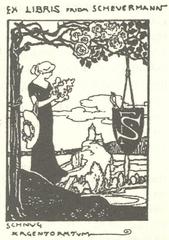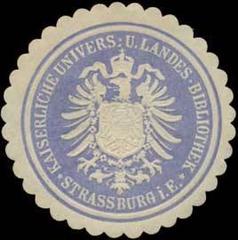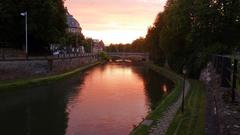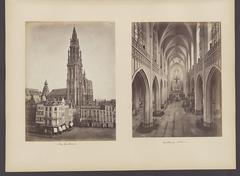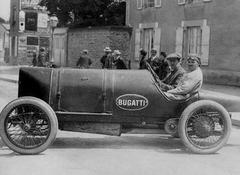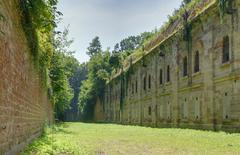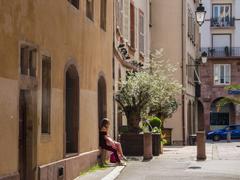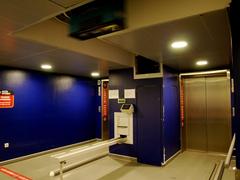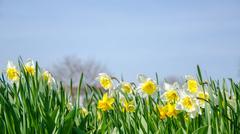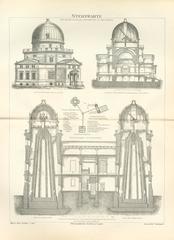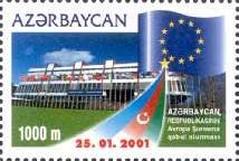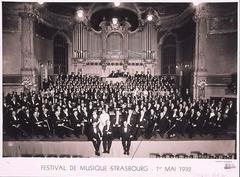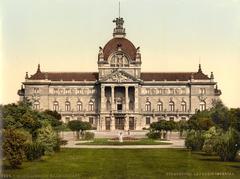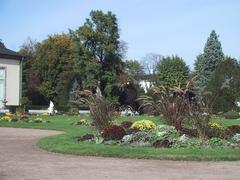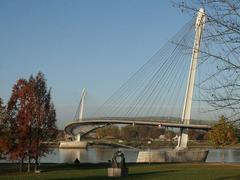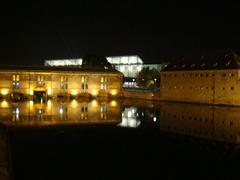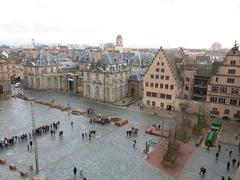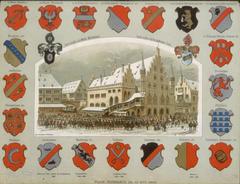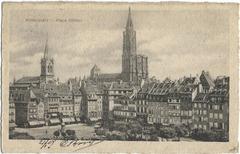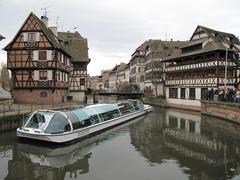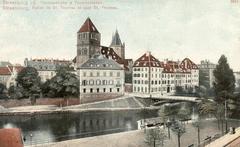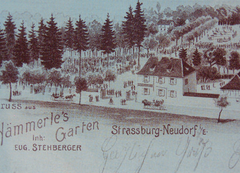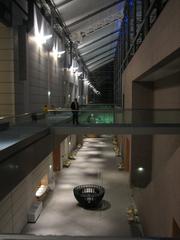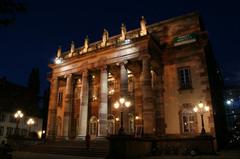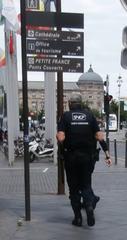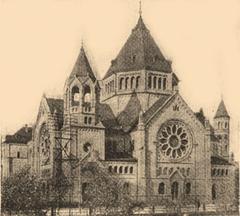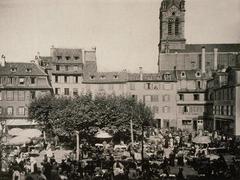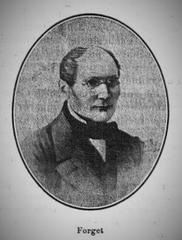Synagogue De La Paix Strasbourg Visiting Hours, Tickets, and Historical Sites Guide
Date: 04/07/2025
Introduction
The Synagogue de la Paix in Strasbourg stands as a symbol of resilience and renewal at the heart of the city’s vibrant Jewish community. Located near Parc du Contades in the Neustadt district, it merges modern architecture with deep historical significance, serving as both a spiritual center and a monument to Jewish heritage. The synagogue was inaugurated in 1958 following the destruction of the original Grande Synagogue by the Nazis in 1940, solidifying its role as a beacon of continuity and peace. With unique features such as intricate ironwork, artwork by Jean Lurçat, and a memorial garden commemorating Holocaust victims, the Synagogue de la Paix offers a meaningful experience for visitors interested in history, architecture, and culture (strasbourg.eu, touristplatform.com, visitstrasbourg.fr).
Table of Contents
- Historical Background
- Construction and Features of Synagogue de la Paix
- Architectural and Artistic Highlights
- Community Role and Expansion
- Visitor Information
- Memorialization and Contemporary Significance
- Frequently Asked Questions (FAQ)
- Conclusion and Further Resources
Historical Background
Early Jewish Presence in Strasbourg
Jewish life in Strasbourg traces back to the 12th century, with the community enduring periods of prosperity, persecution, and renewal. The late 19th century, after the Franco-Prussian War, saw a significant influx of Jewish families, strengthening the community’s presence and leading to the construction of major communal institutions (touristplatform.com, visitstrasbourg.fr).
The Grande Synagogue: Quai Kléber (1898–1940)
The first grand synagogue, located on Quai Kléber, was inaugurated in 1898 and designed by Ludwig Levy in a neo-Romanesque style. It was an architectural jewel and the heart of Jewish religious life in the city, accommodating up to 1,600 worshippers (jewish-heritage-europe.eu).
WWII Destruction and Postwar Recovery
In 1940, the Nazis set fire to the Quai Kléber synagogue, which was later demolished, symbolizing the devastating impact of the Holocaust on Strasbourg’s Jewish community. After liberation, efforts led by Grand Rabbi Abraham Deutsch focused on rebuilding, resulting in the establishment of the Synagogue de la Paix (fr.wikipedia.org).
Construction and Features of Synagogue de la Paix
Construction of the Synagogue de la Paix began in 1954, culminating in its inauguration on March 23, 1958. Architect Claude Meyer-Lévy’s modernist design marked a departure from the ornate styles of the past, featuring reinforced concrete, a basilica-type floorplan, and a façade adorned with Stars of David. Master ironworker Gilbert Poillerat contributed the synagogue’s distinctive ironwork, while a tapestry parochet by Jean Lurçat from Aubusson graces the Holy Ark (strasbourg.eu, cibr.fr).
Architectural and Artistic Highlights
- Façade and Ironwork: The front of the building features a geometric grid of Stars of David and Hebrew inscriptions representing the twelve tribes of Israel.
- Interior Sanctuary: Flooded with natural light, the sanctuary seats over 1,000 worshippers and is punctuated by modernist liturgical furnishings and stained glass windows by Max Ingrand.
- Artistic Details: The parochet tapestry and wrought ironwork signify the fusion of tradition and modernism.
- Memorial Garden: A poignant outdoor space with a bronze model of the destroyed Quai Kléber synagogue and a wall inscribed with Holocaust victims’ names (jewish-heritage-europe.eu).
Community Role and Expansion
The synagogue serves as the seat of the Chief Rabbinate of Bas-Rhin, with Ashkenazi and Sephardi oratories, a community center, educational institutions, and the Jewish radio station “Radio Judaïca.” Recent expansions include the Grand-Rabbin-Max-Warschawski cultural center and spaces for youth activities, reflecting the community’s ongoing growth (worldjewishtravel.org).
Visitor Information
Visiting Hours and Tickets
- Opening Hours: Tuesday to Sunday, 10:00 AM to 5:00 PM. Closed Mondays, Shabbat (Friday evening to Saturday evening), and major Jewish holidays.
- Tickets: General admission is free; donations are encouraged. Guided tours (recommended for a deeper experience) generally cost €5, self-guided visits €3. Advance booking is advised for groups and tours.
- Contact: Visit the official website of the Strasbourg Jewish Community for the latest details (strasbourg.eu).
Accessibility
The building is wheelchair accessible, with ramps and adapted entrances. Accessible restrooms and assistance for visitors with reduced mobility are available upon request.
Getting There
- Address: 1a Rue du Grand Rabbin René Hirschler, near Parc du Contades.
- Public Transport: Accessible via tram lines B and E (stop: “Parc du Contades”) and bus.
- Parking: Public parking is available nearby.
- Proximity: A short walk from Place de la République and Strasbourg’s city center.
Nearby Attractions
- Medieval Mikveh: The oldest Jewish architectural relic in the city, dating to the 12th century.
- Musée Alsacien: Exhibits Jewish ritual objects and regional cultural history.
- Strasbourg Cathedral, Petite France, and the European Parliament: All easily accessible from the synagogue (france.fr).
Guided Tours and Virtual Visits
Guided tours are available in French, English, and sometimes German, led by knowledgeable staff or community members. Virtual tours and multimedia presentations are offered online for remote visitors.
Memorialization and Contemporary Significance
The synagogue’s memorial garden, inaugurated in 2020, is dedicated to the memory of the destroyed Quai Kléber synagogue and over 2,500 Holocaust victims from Bas-Rhin. Annual ceremonies and educational initiatives foster remembrance and interfaith dialogue, affirming the synagogue’s role in promoting unity and peace (jewish-heritage-europe.eu).
Frequently Asked Questions (FAQ)
Q: What are the visiting hours for the Synagogue de la Paix?
A: Tuesday to Sunday, 10:00 AM–5:00 PM. Closed Mondays, Shabbat, and major Jewish holidays.
Q: Is there an admission fee or ticket required?
A: General admission is free. Guided tours cost €5; self-guided visits €3. Donations are encouraged.
Q: Is the synagogue accessible for visitors with disabilities?
A: Yes, with ramps, adapted entrances, and accessible restrooms.
Q: Are guided tours available?
A: Yes, in multiple languages by prior arrangement.
Q: Can I take photos inside?
A: Photography is permitted in public areas, except during services or private events.
Q: What security measures are in place?
A: Expect a security checkpoint and possible bag inspection; identification may be requested.
Conclusion and Further Resources
The Synagogue de la Paix stands as a living monument to Strasbourg’s Jewish heritage, offering an enriching visitor experience that spans history, architecture, spirituality, and culture. Its striking design, memorial spaces, and active community life invite visitors to connect with the enduring values of peace, unity, and remembrance. Whether you are planning a guided tour, interested in educational programs, or simply exploring Strasbourg’s historical sites, the synagogue provides an essential stop on your journey.
Plan your visit, discover nearby Jewish heritage sites, and engage with the broader cultural landscape of Strasbourg. For updates on visiting hours, tickets, and special events, consult the official tourism resources below.
Suggested Visuals
- Exterior view: “Synagogue de la Paix Strasbourg façade with Star of David ironwork”
- Interior: “Interior of Synagogue de la Paix with Holy Ark and Jean Lurçat tapestry”
- Memorial garden: “Memorial garden with bronze model of Quai Kléber synagogue”
- Map: “Map showing Synagogue de la Paix and nearby Strasbourg historical sites”
Sources and Further Reading
- The Best Jewish Heritage Sites to Visit in Strasbourg (Tourist Platform)
- Strasbourg Religious Heritage Guide (Visit Strasbourg)
- Jewish Heritage Route of Alsace (France.fr)
- Official Strasbourg City Website – Synagogue de la Paix
- World Jewish Travel – Synagogue de la Paix Listing
- Jewish Heritage Europe – France Memorial
